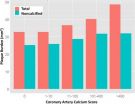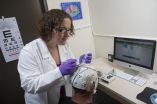Nearly one-third of early adulthood depression could be linked to bullying in teenage years
Antibullying interventions at school may help reduce depression in later years
2015-06-03
(Press-News.org) Bullying in teenage years is strongly associated with depression later on in life, suggests new research published in The BMJ this week.
Depression is a major public health problem with high economic and societal costs. There is a rapid increase in depression from childhood to adulthood and one contributing factor could be bullying by peers. But the link between bullying at school and depression in adulthood is still unclear due to limitations in previous research.
So a team of scientists, led by Lucy Bowes at the University of Oxford, carried out one of the largest studies on the association between bullying by peers in teenage years and depression in early adulthood.
They undertook a longitudinal observational study that examined the relationship between bullying at 13 years and depression at 18 years.
They analysed bullying and depression data on 3,898 participants in the Avon Longitudinal Study of Parents and Children (ALSPAC), a UK community based birth cohort.
The participants completed a self-report questionnaire at 13 years about bullying and at 18 years completed an assessment that identified individuals who met internationally agreed criteria for depressive illness.
Of the 683 teenagers who reported frequent bullying at more than once a week at 13 years, 14.8% were depressed at 18 years. And of the 1446 teenagers who had some bullying of 1-3 times over six months at 13 years, 7.1% were depressed at 18 years.
Only 5.5% of teenagers who did not experience bullying were depressed at 18 years.
Around 10.1% of frequently bullied teenagers experienced depression for more than two years, compared with 4.1% from the non-bullied group.
Overall, 2668 participants had data on bullying and depression as well as other factors that may have caused depression such as previous bullying in childhood, mental and behavioral problems, family set up and stressful life events.
When these factors were taken into account, frequently bullied teenagers still had around a twofold increase in odds of depression compared with those who did not experience bullying. This association was the same for both males and females.
The most common type of bullying was name calling - 36% experienced this, while 23% had belongings taken.
Most teenagers never told a teacher (41%-74%) or a parent (24%-51%), but up to 75% told an adult about physical bullying such as being hit or beaten up.
If this were a causal relationship up to 30% of depression in early adulthood could be attributable to bullying in teenage years, explain the authors, adding that bullying could make a substantial contribution to the overall burden of depression.
While this is an observational study and no definitive conclusions can be drawn about cause and effect, they say that interventions to reduce bullying in schools could reduce depression in later life.
In an accompanying editorial, Maria M Ttofi from the University of Cambridge writes that this study has clear anti bullying messages that should be endorsed by parents, schools and practitioners. She also calls for more research to establish the causal links between bullying and depression, and to drive specific interventions to reduce victimisation.
INFORMATION:
ELSE PRESS RELEASES FROM THIS DATE:
2015-06-03
There is no strong evidence that the popular smoking cessation drug varenicline is associated with increased risks of suicidal behaviours, criminal offending, transport accidents, traffic-related offences, and psychoses, finds a study in The BMJ this week.
The findings are based on over 69,000 individuals in Sweden who were prescribed varenicline between 2006 and 2009. Previous reports suggesting a link may not have taken full account of underlying risk factors, say the authors.
Varenicline is widely prescribed for the treatment of nicotine dependence, but reports that ...
2015-06-03
DURHAM, N.C. -- A long-term study of mother-child pairs in Pakistan has found that the children turn out pretty much the same, whether or not their mothers received treatment for depression during pregnancy.
An earlier study of the same population found that the mothers themselves benefited from the treatment, with less depression, and demonstrating related healthy behaviors with their newborns, such as breastfeeding. But those improvements were short-lived.
The "Thinking Healthy Programme" is a successful depression intervention evaluated through a randomized trial ...
2015-06-03
Washington, DC--Relying on the better-functioning side of the body after a stroke can cause brain changes that hinder rehabilitation of the impaired side, according to an animal study published June 3 in the Journal of Neuroscience. Strokes that occur in one brain hemisphere can result in poor motor function on the opposite side of the body, leading to heavy reliance on the "good" side. This study, led by Soo Young Kim and performed at the University of Texas at Austin and the University of California, Berkeley, found that such compensation produces structural brain changes ...
2015-06-02
OAK BROOK, Ill. -- Non-calcified arterial plaque is associated with diabetes, high systolic blood pressure and elevated 'bad' cholesterol levels in asymptomatic individuals, according to a new study published online in the journal Radiology.
Coronary artery disease (CAD) is the leading cause of death in men and women worldwide, accounting for 17 million deaths annually. Current treatment strategies focus on cardiovascular risk and serum cholesterol levels rather than direct assessment of extent of disease in the coronary arteries.
Plaque that forms in the arterial walls ...
2015-06-02
A new study shows that social and sensory overstimulation drives autistic behaviors. The study, conducted on rats exposed to a known risk factor in humans, supports the unconventional view of the autistic brain as hyper-functional, and offers new hope with therapeutic emphasis on paced and non-surprising environments tailored to the individual's sensitivity.
For decades, autism has been viewed as a form of mental retardation, a brain disease that destroys children's ability to learn, feel and empathize, thus leaving them disconnected from our complex and ever-changing ...
2015-06-02
You might not need to remember those complicated e-mail and bank account passwords for much longer. According to a new study, the way your brain responds to certain words could be used to replace passwords.
In "Brainprint," a newly published study in academic journal Neurocomputing, researchers from Binghamton University observed the brain signals of 45 volunteers as they read a list of 75 acronyms, such as FBI and DVD. They recorded the brain's reaction to each group of letters, focusing on the part of the brain associated with reading and recognizing words, and found ...
2015-06-02
San Antonio -- June 2, 2015 -- A close-up of Comet 67P/Churyumov-Gerasimenko by NASA's ultraviolet instrument surprised scientists by revealing that electrons close to the comet's surface -- not photons from the Sun as had been believed -- cause the rapid breakup of water and carbon dioxide molecules spewing from the surface.
Since last August, the European Space Agency's Rosetta spacecraft has orbited within a hundred miles of the comet in this historic mission. The spectrograph onboard, named Alice, specializes in the far-ultraviolet wavelength band and was developed ...
2015-06-02
Menopausal hormone therapy (MHT) given to recently postmenopausal women in the US for up to four years does not improve cognition, but may have some positive benefits for some mood symptoms, according to a study published by Carey Gleason and colleagues from the University of Wisconsin, Madison, USA, in this week's PLOS Medicine.
The researchers reached these conclusions by conducting a randomized placebo-controlled clinical trial (the KEEPS-Cog trial), including 693 recently postmenopausal women living in the US who were randomly assigned to receive either oral estrogen ...
2015-06-02
What if your doctor told you that your weight is somewhere between 100 and 400 lbs.? With any ordinary scale every patient can do better at home. Yet, one patient can't: the Milky Way. Even though today we peer deeper into space than ever before, our home galaxy's weight is still unknown to about a factor of four. Researchers at Columbia University's Astronomy Department have now developed a new method to give the Milky Way a more precise physical checkup.
The Milky Way consists of roughly 100 billion stars that form a huge stellar disk with a diameter of 100-200 thousand ...
2015-06-02
PHILADELPHIA--(June 2, 2015)--Senescence, a phenomenon in which cells cease to divide and grow, can be caused by everything from natural DNA damage to treatment with chemotherapy. However, several mechanisms allow for cells to bypass senescence and grow out of control, eventually becoming cancerous. Now, scientists at The Wistar Institute have identified how a specific variant of a key protein complex found in human cells called condensin can reorganize a cell's genetic architecture in such a way as to promote senescence, making it an important facilitator in a cell's ...
LAST 30 PRESS RELEASES:
[Press-News.org] Nearly one-third of early adulthood depression could be linked to bullying in teenage years
Antibullying interventions at school may help reduce depression in later years

